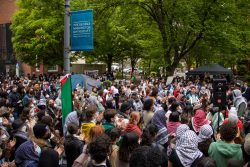Three Afghan students visiting Georgetown for a weeklong U.S.-Afghan relations exchange program disappeared from their Leavey Center hotel rooms the night of Tuesday, Jan. 28. It was not immediately clear where they had gone, though the University confirmed that some of the missing students have family in the United States.
The University identified the missing students as Soma Akrami, Muzhda Asadi and Nazifa Sarwari. All are 24-year-old natives of Kabul, the Afghan capital.
The three Afghan students failed to arrive at a scheduled 8 a.m. meeting Wednesday morning. When the students were discovered missing from their rooms, the Department of Public Safety, D.C. Metropolitan Police and federal authorities were all notified, according to University spokeswoman Gloria Lacap.
MPD spokesman Sgt. Joe Gentile said the department is handling the matter as a missing persons case. Neither he nor Director of Public Safety William Tucker was able to confirm any further details. According to Georgetown students at the conference, federal and local authorities interviewed the three remaining Afghan women.
A scheduled visit to the White House to meet with First Lady Laura Bush and Chief of Staff Andrew Card Wednesday morning was immediately cancelled. White House representatives met with the remaining students later in the week. The remainder of the Afghan delegation left Washington for Kabul early Friday morning.
The students were staying on the fourth floor of the Marriott Georgetown University Conference Center hotel, located in the Leavey Center. Several other participants in the program, including Shariaf Fayez, the Afghan minister of higher education, were staying on the same floor. Two of the three missing students, Sarwari and Akrami, were roommates.
It is not known what type of visas the missing students received. According to Danielle Sheahan, spokeswoman for the Immigration and Naturalization Service, only businesspeople typically receive extremely short-term visas. General visitors’ visas can be issued for any period of time, often at least six months.
If a visa expires and the holder is still in the United States, the INS prioritizes their case based on whether or not they pose a criminal threat. People who pose no danger might remain indefinitely. “Sometimes people just get lost in the shuffle,” Sheahan said.
No authorities would comment on the students’ current whereabouts, including Haron Amin, deputy chief of missions for the Afghan embassy to the United States, who participated in many of the program’s events.
“It was regrettable, and at the same time condemnable,” Amin said of the students’ disappearance.
The students arrived on campus on Friday, Jan. 24 for “Blueprint for the Future—Connecting Afghan and American College Students,” a program which involved six students from Afghanistan, all women, 11 students from Georgetown and three male Afghan students from other colleges in the United States.
The program, financed by DaimlerChrysler, was organized by the Afghan Ministry of Higher Education, Georgetown University and Looking Glass Productions, an Arlington, Va. public relations firm with prior experience in Afghan-American relations.
“Blueprint for the Future” was originally planned as a dialogue between ten Georgetown students and ten Afghan students. However, none of the four male students from Afghanistan who were selected to participate were cleared to enter the United States in time for the program.
The centerpiece of the program was a series of “working sessions,” discussions among the students focused on issues such as human rights, economic development, education and public health. During the week, the students also attended a concert featuring cellist Yo-Yo Ma, visited Sen. Richard Lugar (R-Ind.), Senate Foreign Relations Committee chairman, on Capitol Hill, and had the option to see the Georgetown men’s basketball game against Seton Hall on Jan. 29. Throughout the event, Georgetown students and Looking Glass Productions employees chaperoned the Afghan students.
According to Mita Menezes (CAS ‘03), a student organizer for the program and president of the College Academic Council, all six Afghan students had returned to their hotel rooms by 9:30 p.m. Tuesday night. Earlier that day, said Menezes, the students went shopping at a Target store in Alexandria, Va. After eating dinner in Healy Hall, some of the students visited friends near campus, while others watched last week’s State of the Union address on television.
Aaron Wessells (SFS ‘04), a member of the Georgetown student delegation, said the conference remained very productive after the students’ disappearance. “Although we were very sad that they left, we engaged the remaining three Afghan women in small group discussions and produced thoughtful presentations for the last day of the forum,” Wessells said.
According to Menezes, after the three students went missing, the sessions became especially productive. “Afghanistan wasn’t just something on paper,” she said. “These people lived there, they ran away from it … They’ve lived at war for 20 years.”
“The room was buzzing,” she said.
In autobiographies published in the conference materials, Sarwari and Akrami described their experiences under the fundamentalist Taliban, which ruled Afghanistan from 1996 to 2002.
During that time, Akrami left Afghanistan for Iran, where she worked in a beauty parlor before returning to her native country in 2000.
“During [the] Taliban regime, there was no permission for women to work in any places of Afghanistan,” she wrote.
Sarwari’s education was interrupted for five years during the Taliban’s rule, before returning last year. “After the victory of our government,” Sarwari wrote, “with great desire we came to our university.”
Sarwari and Akrami are now both students at the Kabul Educational University studying English language and literature. Asadi is a student in the medical faculty of Kabul University.
Professor Michael Hudson of the Center for Contemporary Arab Studies expressed little surprise that the Afghan students might attempt to emigrate.
“That’s completely understandable. The United States is a place with tremendous opportunity, tremendous economic security. Afghanistan is the opposite,” he said.




